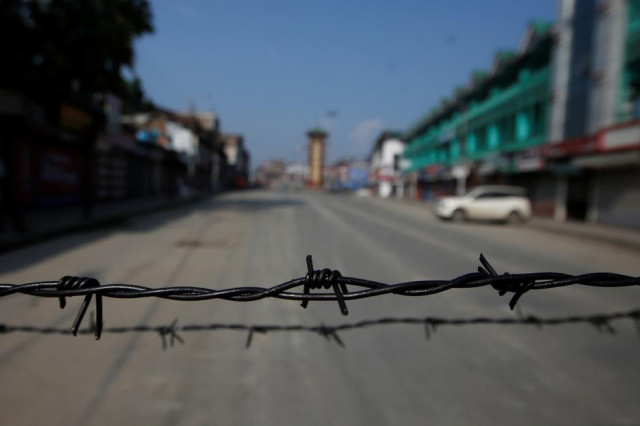The solemn case of Kashmiri women
The effects of rape can be seen where gender roles are disrupted

We enjoy support of 220 million Pakistani people in this regard, says Sardar Masood. PHOTO: REUTERS/FILE
With the Indian lockdown of IOK having completed 170 days, and a complete censorship of information from the region, one cannot disregard the possibility of the brutalities that could be taking place under the Indian military. While enforced disappearances and torture of men and boys at the hands of the Indian security forces is common knowledge, rape and sexual violence against women is also a regular occurrence, albeit less talked about.
The use of sexual violence by state actors is usually sanctioned by the state. This could be through an active policy, as in the case of Bosnia, where the RAM plan documents the strategy invoked by Serb army officers in the Yugoslav National Army (JNA); or that even though the state does not have a policy of sexual violence in place and enacts laws against such brutalities, it still does not condemn its officers when they commit sexual violence against a population. The state indirectly condones the crimes, as it follows a passive policy of approval by not taking due action against officers accused of sexual violence, as in the case of Indian forces being accused of rape of Kashmiri women.
Human Rights Watch reports have recorded an increasing trend of rape in remote and poor villages in IOK at the hands of Indian security forces, where women are less likely to report the incident. In the cases where the incidents were reported, Indian army officers accused of raping Kashmiri women were acquitted through the manipulation of laws and by usually citing reasons such as victims sustaining injuries after falling in the cross-fire between security forces and “militants”, doubtful testimony of the prosecutor or by challenging the victim’s character, hence her testimony.
Similarly, in the case of Mubina Gani — a bride who was on her way from her wedding to her husband’s house — and the Kunan Pohspora incident of 1991 where army officers raped a number of women from the area, no officers were convicted as the army officials denied any complaint being registered by the locals. Further investigation was also shut down as officials in Delhi denied the charges.
Moreover, the Indian military is in a position of power, and has a strong hierarchy which ensures orders are followed using the top-down approach. The state and the army influence soldiers with nationalistic and patriotic ideology, which has been seen through the statements of various ministers since the abrogation of Article 370 of the Indian Constitution. Moreover, a former Major General, SP Sinha, even went as far as to advocate sexual violence in Kashmir on live television, as he called for “death in return for death, and rape in return for rape”.
The case of Kashmir mainly draws on the patriarchal idea that women are the honour of the family and the patriarch or male members are to protect them. Rapes that take place are an infringement on both genders’ roles, and are indicative of how men failed to uphold their role in society when Indian troops are able to infringe upon the sanctity of the home and rape Kashmiri women.
Even though the practice is not systematic and not actively sanctioned under the state, it is not condemned and accounted for either. The effects of rape can be seen where gender roles are disrupted. Women are shunned for being victims, and at times, entire villages are shunned in response to the victim’s ordeal. The Indian forces make use of these cultural practices and enhance these cleavages by carrying out rape as a weapon of war. The strongest impact it has is that it breaks up the societal harmony and equilibrium, thereby rendering a society damaged; irrecoverable from the trauma it has endured.
Published in The Express Tribune, January 22nd, 2020.
Like Opinion & Editorial on Facebook, follow @ETOpEd on Twitter to receive all updates on all our daily pieces.














COMMENTS
Comments are moderated and generally will be posted if they are on-topic and not abusive.
For more information, please see our Comments FAQ